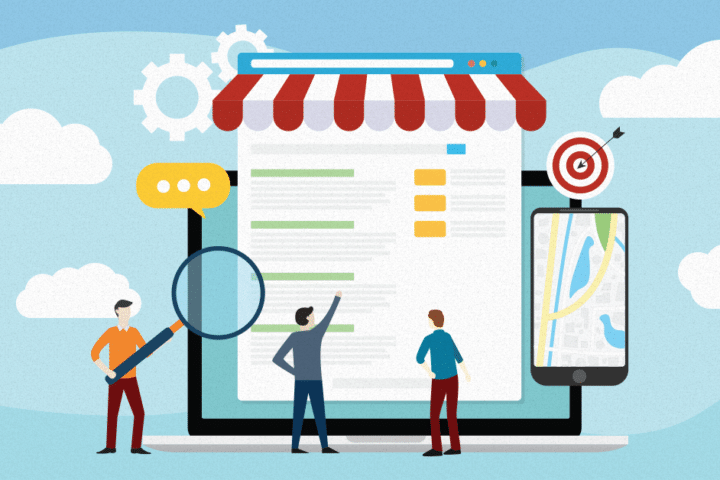Search engine optimization (SEO) can be intimidating for those setting up a Shopify storefront. It’s a subject that seems to change by the day, and many people are unsure where to start. That’s why we’ve created this comprehensive beginner’s guide to Shopify SEO for those just starting!
Now, before jumping into the nitty-gritty of SEO tips and best practices, we think it’s crucial to take a moment to understand what ecommerce SEO is and just why it’s essential for your online storefront.
What is Ecommerce SEO?
Ecommerce refers to buying and selling products and services over the internet. Ecommerce has become a trillion-dollar industry, with forecasts showing that its market size is expected to grow at a compound annual growth rate (CAGR) of approximately 14.7% through 2027.
With B2B brands making up approximately 63.1% of the market and B2C making up the other 36.9%, it’s clear that ecommerce is more than a passing trend for both business buyers and everyday consumers.
A large part of the success of ecommerce can be attributed to the rise of search engines and their ability to connect people with products, services, and information. However, a brand must invest in its ecommerce SEO strategy to do this successfully.
Ecommerce SEO is optimizing your website and its content to ensure that search engines like Google and Bing find it. This is done through a combination of tactics, including website design, content strategy, and link building. These tactics all work together to improve your site’s chances of being found by people searching for your products and services.
How Does Shopify SEO Work?
Shopify is a powerful ecommerce platform that makes up approximately 11% of the entire ecommerce market, making it the third most popular ecommerce platform worldwide — and for a good reason. It’s an excellent platform for anyone looking to get up and running quickly, and it has a robust ecosystem of apps and add-ons that make it easy to customize your online store to fit your business.
With more than one million businesses using Shopify, standing out from the pack is critical, and optimizing your store for search engines is the best way to do that.
While most brands already understand how SEO works for a standard website or blog, Shopify SEO is slightly different. Unlike a traditional website, an ecommerce store is a unique environment, so it’s important to know how to optimize your pages for search engines. Instead of hyper-focusing on keywords and SEO content, it’s more important to focus on how your store is organized, creating a user-friendly experience, and building a strong backlinking strategy.
Of course, keyword placement is still essential. It just requires moving out of a long-form content creation mindset and, instead, optimizing short product descriptions, meta information, etc. With the right approach, Shopify SEO can be a powerful tool for improving your store’s visibility and increasing sales.
If all this seems a little overwhelming, don’t worry. We’ve got you covered. In this beginner’s guide to Shopify SEO, we’ll walk you through everything you need to know to optimize your store for search engines and get your products and services in front of the right customers.
Shopify SEO Tips & Best Practices
It’s no secret that selling online is more competitive than ever. You need to get your SEO game on, and if you’re new to using Shopify, you may need some help getting started. Here is your complete ecommerce SEO checklist for Shopify with tips, tricks, and best practices to help you hit the ground running.
Shopify Stores
When you first set up your Shopify store, it’s important to take a few minutes to set up your site hierarchy properly. This is one of the most important steps in getting your SEO strategy on the right foot. An intuitive site structure will help search engines crawl your store and find your products, but it’s also just as important for your customers.
A site hierarchy is the structure of your website. It’s the way your products, categories, and pages are organized. When it comes to Shopify SEO, it’s also the way your products are organized on your homepage, category pages, product pages, and more.
The key to success when building your site hierarchy is to:
- Organize according to your audience’s needs
- Simplify your navigation and make it easy for users to find what they’re looking for
- Utilize appropriate keywords to make searching/crawling easier
Shopify Products and Collections
Shopify collections refer to how you group your products or services. Ideally, you’ll create a page for each collection and then an individual product page for each product/service within the collection. Once each page is created, you’ll want to ensure you’re writing detailed descriptions for each product/service and include relevant keywords within the text.
You’ll also want to be sure that you’re taking the time to optimize each page’s meta information, including:
- Title Tags
- Headers
- Meta Titles
- Meta Descriptions
- Image/Video Alt-Texts and Alt-Tags
Shopify Blog Post SEO
One of the most appealing features of the Shopify platform is that they offer the option to create a blog for your brand to go along with your storefront. This is a great way to generate more traffic because 64% of consumers are happy to do business with brands they feel are genuinely taking the time to connect with their consumers.
A blog is an excellent way to connect with your audience, share your story, and build your brand. When it comes time to optimize your blog, you need to follow some of the same guidelines as optimizing for product pages. However, you want to ensure you are also working on building a strong internal and external strategy.
A robust linking strategy is essential to the success of your blog. It helps to boost your search engine rankings by making sure your content is from reputable sources, which helps to build trust and authority for your brand. Also, the more internal links to other content that you have within your blog, the easier it is for the search engines to crawl and index your content.
Shopify SEO Apps & Tools
Many different apps and tools are available to help simplify your Shopify SEO. As your business grows, you’ll want to be sure that you’re taking the time to consistently evaluate which apps and tools are the best for your current needs and which ones are a waste of your time and money. This will help you to spend more time focusing on the areas of your business that require the most attention.
Not quite sure which SEO tools to start with? Here are a few of our favorites:
- Google Search Console for Shopify: Google Search Console is an excellent tool to help you keep tabs on your rankings within the search engine. It also allows you to track your crawl stats, which can help to identify areas of your site that aren’t being indexed or crawled. It even allows you to submit your site map directly to the search engine to help speed up the indexing process.
- Yoast for Shopify: Yoast for Shopify is an SEO plugin that allows you to optimize your page titles, meta descriptions, and SEO titles in a single platform. This is one of the most popular SEO plugins on the market, and the free version offers excellent functionality.
- Image Optimizers for SEO and Page Speed: Image optimization significantly impacts your site’s page speed and the overall user experience. This is an easy way to help reduce the size of your images without sacrificing quality, which helps to improve the overall page speed of your site. Image Optimizers also allow you to write SEO titles and alt-text for each of your images, which helps to increase your SEO ranking and generate more traffic.
- Product Review Apps: Product review apps are a great tool to help collect consumer reviews and place them on your site. This can impact your overall SEO ranking, raise brand awareness, and increase traffic to your Shopify storefront.
It’s also important to note that while these apps and tools do help to simplify your SEO process, they are not a replacement for a professional SEO strategy.
Finding the Best SEO Agency for Your Shopify Store
While it’s true that Shopify SEO can be done on your own, it’s a good idea to consider working with an SEO agency, especially if you’re just getting started. A good SEO agency will be able to help you with all the SEO aspects of your Shopify store and help build you an SEO strategy that will help you rank higher in search results and drive more traffic to your site.
Finding the right SEO agency for your needs takes time and research. If your research brought you to us, then you may be ready to end your search!
Are you ready to dominate your Shopify SEO?
Let’s get started! Book your consultation today with our SEO team!



